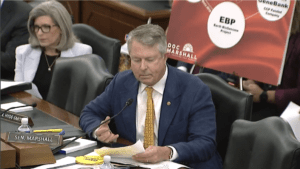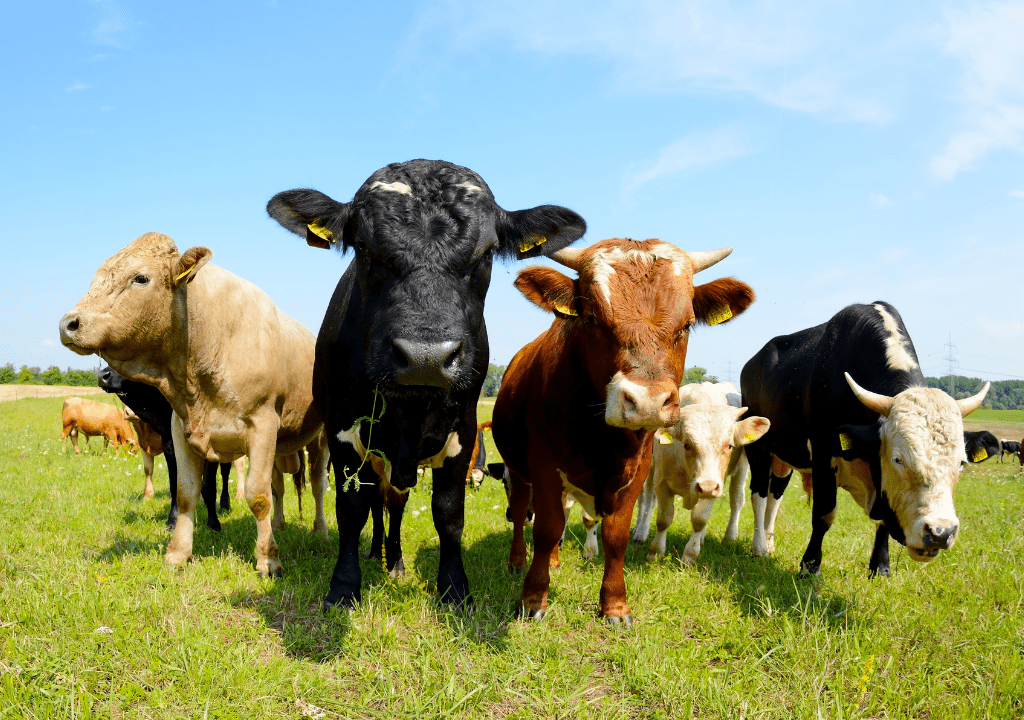What’s driving up food prices and putting ranchers out of business? Is it competition from deep-pocketed investors and foreign ownership of agribusiness consolidating the market? Is it the Chinese, often Capitol Hill’s favorite villain? The Senate Agriculture Committee held a hearing titled Foreign Ownership in U.S. Agriculture to see if they could figure this out.
The average price of food in the United States increased 4.3% in the 12 months ended August, after posting an annual increase of 4.9% in July, according to the latest inflation data published Sept. 13, 2023, by the U.S. Labor Department’s Bureau of Labor Statistics (BLS). In August 2022, the food prices were 11.4% higher than the previous month, representing the highest jump in food prices since 1979. Food prices are still averaging higher than the overall inflation rate. Could it be due to a greater concentration of corporate ownership in certain sectors of American agribusiness?

“In the last several decades, our entire economy, but especially the agricultural sector, has concentrated power and profits into the hands of a small group of corporations. And several of those big corporations are foreign-owned.” — NJ Senator Corey Booker.
“Major U.S. food and agriculture companies have been bought by foreign companies and American farmers and families have raised many questions about the economic impacts of foreign purchases in our food supply,” said committee Chairwoman Debbie Stabenow (D-MI). “The American people deserve careful consideration of how foreign investment will affect the future of our farms, ranches, and agricultural economy,” she said, noting that foreign investors today hold an interest in nearly 40 million acres of American farm and forest land, which represents just over 3 percent of all privately held agricultural land in the U.S. Foreign ownership has increased 66 percent since 2010, nearly two million acres per year. The largest foreign stakeholders in American farmland remain countries like Canada, the United Kingdom, and those in Europe while Chinese ownership is less than 1 percent despite being the country most singled out by Senators in Wednesday’s hearing on Capitol Hill.
Stabenow said the government lacks the proper oversight tools to see the whole farming industry picture clearly. “It’s important to consider what impacts foreign investment can have on U.S. farmers and consumers.”
On the issue of foreign concentration in the meat packing business in particular, the U.S. has two foreign companies – JBS and Marfrig of Brazil – that run 40% of the beef business. Imports of beef are on the rise, including from JBS’ home market in Brazil. Approximately 20% of the beef in the U.S. market is now imported. In 2019, for the first time in U.S. history, the country became more dependent on foreign supply chains for food, putting our food security at risk – a topic the Senate Agriculture Committee addressed in its hearing on Sept. 27. While most Americans envision a countryside full of grazing cattle or – in big, highly concentrated markets like Texas and Oklahoma, large factory farms with hundreds of cattle grazing in tight quarters in a barn – the once mighty U.S. cattle market is now a net importer of beef.
Sen. Corey Booker (D-NJ) made a salient point during the Q&A session: who controls our farmland is an important issue. “And honestly, my concern is with who controls many other parts of our food system, including our seeds, meat processing, and grocery stores,” he said. “In the last several decades, our entire economy, but especially the agricultural sector, has concentrated power and profits into the hands of a small group of corporations. And several of those big corporations are foreign-owned. I support legislation that would prevent foreign corporations from continuing to purchase U.S. farmland. We need to also have a hearing on the rate at which domestic investors – pension funds and hedge funds – are buying up U.S. farmland as an investment strategy and what that means for American agriculture,” Booker concluded.
According to a recent report by the business intelligence group Agri Investor, institutional investors spent over $12 billion on U.S. farmland in 2021. Booker, and others, questioned one witness from the U.S. Department of Agriculture – Gloria Montano Greene, the Deputy Under Secretary for Farm Production and Conservation – if foreign companies had access to U.S. government farm grants. And whether or not private equity investors did too. She said she did not know.
Booker said that foreign firms and investors should be banned from such programs. He touted his Farmland for Farmers Act, introduced this summer, which bans investment companies from buying farmland. Some 70 farm groups along with the National Family Farm Coalition signed a letter in support of his bill.
Farm State Senators Speak Out
The hearing began with commentary from four farm state senators, including Jon Tester (D-MT), Tammy Baldwin (D-WI), Mike Rounds (R-SD), and James Lankford (R-OK).
“When foreign investors own American farmland and agricultural processing capacity, it can put our country and domestic food supply and local communities at risk and right now we don’t know the full extent of the risk,” Baldwin said. “We saw an increase in food exports from the U.S.-based foreign-owned meat processors during the pandemic while those very same processors jacked up prices of meat at the grocery stores here. That market disruption illuminated the larger trend that we are not in control of our domestic agricultural supply chain. We must ensure that we have access to information about foreign ownership of our food system, and this committee has the opportunity to do so in the next Farm Bill.”
The last Farm Bill was in 2018 and it expired this week.
Jon Tester talked about his Promoting Agriculture Safeguards and Security Act, introduced in January, which made it into the Senate National Defense Authorization Act. That bill requires the Committee on Foreign Investment into the United States, aka CFIUS, to ban China from buying farm land and agribusiness in the U.S. going forward.
But it was Senator Lankford who really won the day with his opening remarks. No one came close. He spoke about a state law that legalized cannabis farming and how foreign investors swooped in, almost all of them for China. His story was the stuff of Hollywood crime-dramas.
“Oklahoma is now number eight in the nation for having land owned by foreign entities in our state since 2018 when we passed cannabis law. In fact, the year after we passed the Medical Marijuana Law in our state, the next year Oklahoma had more land sales to foreign entities than any other state in the nation.
We saw a rush that came into our state. We have great land prices, we have great prices for electricity, and ready access to water. All those features all came together to have a huge amount of land that actually shifted into foreign ownership in the days after the passage of the Medical Marijuana Law. We’ve had a 500 percent increase in our state of foreign ownership of land — just in the past decade. We have 7,000 licensed marijuana growers in our state now, since 2018. In 2017, we had zero. Thousands of those are actually illegal operations that haven’t gone through the full licensing capability. Of those, about 75 percent according to our Oklahoma Bureau of Narcotics are actually Chinese-owned facilities. We’ve also seen in 2022 execution-style murders on a rural farm in Kingfisher, Oklahoma where multiple people were left dead and a shooter was on the run, all of them Chinese nationals, in rural Oklahoma. It has also led to a tremendous amount of human trafficking and sex trafficking to be able to work in these different farms across our state. We have seen over and over again individuals that have come across our southern border illegally that are Chinese nationals that end up in the marijuana farms, and they’re working off their debt, literally being moved from farm to farm to farm. If that’s happening in Oklahoma, what is happening in the rest of the nation? What I’ve seen is a tremendous rise in foreign ownership of land around our country.” – Sen. James Lankford, Agriculture Committee hearing, opening remarks, Sept. 27, 2023.
Lankford talked about his legislation, the SOIL Act, which remains in limbo. The bill puts additional detours in the process of buying farm land and a farm business for foreigners.
“We have foreign ownership across our nation from multiple entities. That’s never been an issue for us as Americans. But we should actually ask the basic question, ‘Why’, before we’re making agricultural land available to them,” Lankford said.
That ‘why’ might just be ‘to make money’ and ‘we have the expertise to do it.’ JBS and Marfrig would be approved to buy today, which has led to increased market concentration in the U.S. beef markets.
Harrison Pittman, a witness and director of the National Agricultural Law Center at the University of Arkansas said that between 2021 and 2022, the state saw a “historic shift” in proposals to buy land from foreigners. “Heading into 2023, that level of intensity and activity basically increased threefold,” he said.
Another witness, David Ortega, Associate Professor of Agricultural, Food and Resource Economics at Michigan State University, was the “China voice of reason” at the hearing. He tended to err on the side of caution when dealing with China and American agribusiness.
Smithfield Foods is now owned by a Chinese company and has been for more than 10 years. Americans might know that brand from the bacon they see on grocery store shelves.

David Ortega, witness during a Senate Agriculture Committee hearing in September.
“Over 80 percent of the Chinese-owned land belongs to Smithfield Foods, and one billionaire investor. The foreign acquisition of U.S. agricultural land by foreign entities doesn’t threaten our ability to produce food, but it does raise specific and sometimes local concerns,” Ortega told the Senate Committee. “It’s vital that any legislative and regulatory response be evidence-based, consider the broader agri food landscape, and aim to strike a balance between safeguarding our national interest and security and promoting economic growth and opportunity. China’s approach to buying farm land is global. They have 20 percent of the world’s population, but less than 10 percent of their land is arable. It’s a big country, but a lot of it is mountainous terrain and they are buying farmland across the world because of it,” he said, adding that the U.S. is one of the top investors in foreign agricultural land. From 2000 to 2016, U.S. entities bought some 8 million acres worldwide in places like Brazil, Argentina, and Eastern Europe.
Ortega warned Senators singling out China that there could be some retaliation and trade implications to consider.
“China is the largest export market for U.S. agricultural and food products,” Ortega said, something that often gets bantered about in Washington as an important piece of leverage in China’s favor. The U.S. exports a lot of grain, most of its soybeans and corn, and tons of beef and pork to China. “It would be far easier for China to find new sources of these products than it would be for American farmers to find new export markets,” Ortega said.
Sen. Roger Marshal (R-KS) brought up a point not mentioned by anyone: seed engineering and intellectual property of GMO seeds.
“BGI Genomics is a China-based biotech company tied at the hips to the Chinese Communist Party and the Chinese military that’s been leading China’s efforts to create the world’s largest genomic repository. Our USDA has provided grant dollars over the past decade to BGI for genomic gathering and data storage. Of great immediate concern though is its relationships with USDA and the American scientific community,” Marshal said. BGI is listed as the Department of Defense, and the U.S. Department of Commerce Entity List.
Marshal also spoke about the Earth BioGenome Project, EBP, which is an international cooperative initiative to sequence the DNA of more than 1.5 million species. BGI provides data collection and data storage for EBP and the USDA has a relationship with the Earth BioGenome Project today.

Senator Roger Marshal said China is deep into agriculture genomics. While this wasn’t a bad thing, he wondered why the USDA would be partnering with Chinese biotech firms in an era of unabated IP theft.
“BGI’s goal is to obtain access to intellectual property, while we pay for the research and development,” Marshal said. “By maintaining relationships with the CCP-related entities directly or indirectly, we place American citizens and our food supply at risk. There is no guardrail. There is no contract, no ethics of scientific research. And the plot thickens. The Earth BioGenome Project and BGI are also part of something even bigger called the Global Virome Project, which is also formed and created with American funding. GVP supports the Trinity Challenge, which has a goal to collect the DNA of every human animal and plant across the world. We, as a nation, are once again financing the research and giving the Chinese Communist Party access to a gold mine of intellectual property that can and will be used against us,” Marshal said.
Ortega pushed back.
“This is a very complex issue. I will say we have very talented Chinese Americans and Chinese scientists working at land grant institutions here in the United States. I think it is in our national interest to collaborate with China on research. That’s all that I’m able to comment on,” he said.
Since 2011, China has become the largest funder of agricultural research and development in the world, surpassing the U.S. and the European Union. They are currently spending five times more on research and development today than the U.S., a lot of it on seed technology, which patents seeds and makes them corporate-owned IP.
Still, while China took the brunt of the criticism here, global ag corporations came in a close second. They were ultimately the main theme of the hearing.
“My concern is about the incredible challenges for young aspiring farmers to get access to land now,” said Sen. Peter Welch (D-VT). “I’m very concerned. A lot of that has to do with the high price and, of course, corporate consolidation that’s made it so.”
What’s being done on this issue, other than bills still in committees that seek to tackle these issues?
Last Week, Sen. Josh Hawley (R-MO.) introduced the Strengthening Antitrust Enforcement for Meatpacking Act (S.2818) to empower antitrust enforcers to break up giant meatpacking and poultry monopolies and place power back in the hands of America’s farmers and ranchers who raise livestock and poultry.
The Hawley bill would prohibit mergers currently considered moderately concentrated in the hands of multinationals. Here, Hawley uses the so-called Herfindahl-Hirschman Index (HHI), which is a measure of market concentration presently employed by the U.S. Department of Justice and the Federal Trade Commission. His bill would prohibit a merger or acquisition by a meatpacker if the HHI is over 1,800. The USDA estimates that the HHI in the national cattle market was 2,458.
R-CALF USA CEO and CPA board member Bill Bullard said his group “applauds Senator Hawley’s novel approach to addressing the untenable market concentrations faced by American ranchers.”












